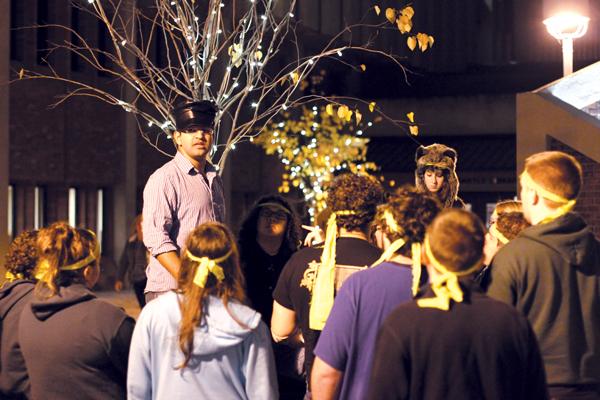
If you happened to notice clusters of students sporting bands of neon fabric and hiding in covert locations around campus, do not fear — these individuals are only zombies on a mission to eat human brains.
The Zombie Student Association (ZSA), an SA-chartered student group, is currently holding the first of its biannual, week-long “Humans vs. Zombies” games. “Humans vs. Zombies” is a massive, orchestrated, multi-day game of tag that involves dozens of students impersonating zombies, many marshmallows and plenty of Nerf weaponry.
The members of ZSA’s Executive Board, who serve as the game’s umpires, begin planning before the semester begins, according to Justin Ahmed, a junior majoring in chemistry and member of the ZSA. They decide on a particular plot line and tweak the game’s rules as necessary. This year’s plot is zombies and aliens, which means players in the game have specialized missions aside from survival.
At the start of the competition, the ZSA E-Board secretly selects one participant to be the “original zombie,” who touches off the undead epidemic. For the first 24 hours of play, the original zombie is disguised as one of the game’s “humans,” who wear neon yellow-green armbands rather than neon headbands, as do their zombie opponents. The original zombie attempts to tag, or “attack,” as many humans as possible during those 24 hours, after which the original zombie must reveal his or her identity.
Zombies are only permitted to use their hands to “infect” the humans — transform them into fellow zombies, that is — whereas humans are permitted to use marshmallows, Nerf “blasters” or socks to stun zombies. Stunned zombies are removed from the game for several minutes before they can return to human hunting.
The campus competition between humans and zombies will conclude tomorrow, as per the ZSA’s guidelines.
Ahmed said that either side is capable of emerging as the winner, but there has never yet been a game of “Humans vs. Zombies” at Binghamton University where the zombies did not wipe out the humans in the end.
He referred to the game as “exhilarating.”
“It’s pretty much just straight paranoia. You’re scared shitless,” Ahmed said.
“Humans vs. Zombies” is played by students at college campuses across the United States and around the world, from China, to India, Australia, Saudi Arabia, Ireland and Chile, among other locales.
Chris Weed first started the game in 2005 when he was a student at Goucher College in Baltimore, according to www.hvzsource.com. “Humans vs. Zombies” participants across the globe use this website to keep track of the progress of their games — how many humans are left, which zombies have infected the most players and the winning team at the end of the game.
BU’s ZSA members have traveled to other schools in New York to play “Humans vs. Zombies” with students from other campuses, and in spring 2010, Ahmed and several friends, who have dubbed themselves the “Alpha Squad” of ZSA, traveled to Penn State along with students from 26 other schools for an invitational game of “Humans vs. Zombies.”
Members of the ZSA are used to being [slandered] by some of their peers who do not share the same enthusiasm for zombie apocalypse simulations.
In its September edition, the Binghamton Review warned new BU students against the ZSA, referring to the club as a “group of virgins.”
“The Binghamton Review is a shit rag,” said Ethan Feilich, a sophomore majoring in economics, in reference to this comment in the Review.
Feilich, a member of Ahmed’s Alpha Squad, said that participating in “Humans vs. Zombies” has brought a nice change of pace to his everyday routine.
“When I go to class, at least there’s something interesting happening,” Feilich said.
When its members aren’t hunting human flesh or running for their lives, the Zombie Student Association participates in charity and community events on and off campus. The club takes part in Relay for Life, volunteers at Ross Park Zoo’s “Boo at the Zoo” and holds a “zombie walk” Downtown.
Michael Villabol, a junior majoring in psychology, said he has been a member of ZSA since his freshman year and feels that many non-enthusiasts would enjoy participating in “Humans vs. Zombies” if they gave it a chance.
“If people actually tried it out, they would understand more about what we’re all about,” Villabol said. “We’re just trying to have fun and do something different.”
Dylan Mahon, a junior majoring in computer science, took a harsher line on campus critics.
“Anyone who passes up having fun because they’re worried about looking cool is a … loser anyway,” Mahon said.


